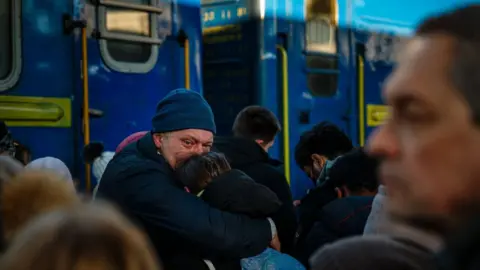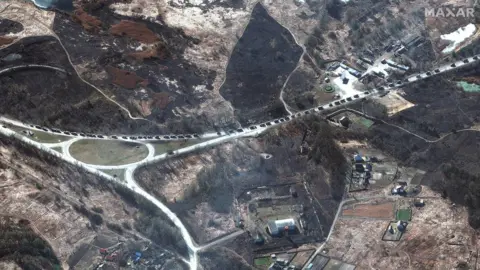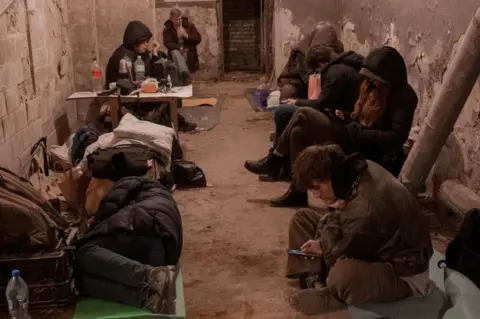Ukraine conflict: Dread in Kyiv as huge Russian convoy advances
 AFP
AFPThere's a biting cold in Ukraine's capital.
The first day of March swept in with an icy blast of wind and snow; the sixth day of Russia's invasion unfolds with a gnawing sense of foreboding. Satellite images convey, with searing clarity, the pace of Russia's progress towards Kyiv. A serpentine armoured convoy, some 65km (40 miles) long, bristling with tanks and troops, slowly snakes forward. It's only 27km away.
It gives an entirely new, and terrifying, meaning to the expression "the world is watching". Everyone can see these satellite images in shades of black and grey, which have a meaning that's all too black and white. But it's only Ukrainian forces, soldiers and civilians who can stop its lumbering advance. Western militaries continue to send in weapons and ammunition, and incessant salvos of strong words. On the ground, Ukraine is on its own.
"We'll burn the convoy," a Ukrainian journalist vows when I meet him in a basement shelter. It's this raw resolve, and burning patriotism, which has fired Ukraine's unexpectedly strong resistance to the mighty Russian army's advance.
 MAXAR TECHNOLOGIES
MAXAR TECHNOLOGIESHe's crouched over his computer and smartphone. Everyone is connected to the world above in this new subterranean world below in basements, bomb shelters and bunkers. The air raid sirens now seem to be wailing on a loop.
At the edge of a hard floor on a thin mat, bespectacled 13-year-old Rustam seems glued to his device, an extension of his lanky teenage frame. Today he's watching TikTok videos of Britain's Prime Minister Boris Johnson; yesterday he was inspecting videos of Chechen fighters with a fearsome reputation on front lines. "Are they coming here too?" he asks me, barely lifting his eyes from his phone. It takes the obsessive "doomscrolling" of our time to a whole new level; this isn't just bad news when you see a Russian convoy heading your way.

Russia attacks Ukraine: More coverage
- LIVE: Latest updates from on the ground
- THE BASICS: Why is Putin invading Ukraine?
- RUSSIA SANCTIONS: 'If I could leave, I would'
- UKRAINE: Desperate scenes in Lviv train station
- IN DEPTH: Full coverage of the conflict

"We didn't sleep last night," his mother Liana confides. "I was on the phone talking to relatives and friends in other cities." A friend who fled to neighbouring Poland calls, crying, that her home was obliterated by a Russian missile. Liana's father is still in their home further north, closer to the Russian border, near Chernobyl, now occupied by Russian forces. He managed to call, on a poor phone signal, to tell her a missile had slammed into their vegetable garden, 100m (328ft) from his room. "I told him so many times he should have let me buy him a good phone so he could send us pictures," she laments.
Next to her, a bulky cat carrier is empty. Their whopping Maine Coon cat, named Tyson after Britain's champion boxer, hasn't lived up to his name. He mostly hides under a bed above ground. But sometimes he comes down to snuggle with Rustam; it makes us both feel better.
 Reuters
ReutersOn the mattress across the floor - all neighbours now - Australian businessman Stephen Rimmer keeps a quiet vigil. "I'd like to get out as quickly as possible," he says, barely concealing his anxiety. Armed with his Turkish passport, he tried to board a train put on for Turkish citizens. But there was pandemonium at the station.
All this wasn't on his itinerary. He was meant to fly out last Thursday - the day Russia moved in. "I just didn't think he would do it," he confesses. Not many people here, or anywhere, thought Russia's President Vladimir Putin would go this far.
Six days on, disbelief has morphed into defiance, and dread.
 AFP
AFPNews from the regional centre of Kherson, to the south, now encircled by Russian forces, tell a story of a gathering siege, the medieval tactic deployed to devastating effect in Syria to starve cities into submission; it's a war crime. So is the use of suspected cluster munitions unleashed against a residential area of Kharkiv, Ukraine's second largest city, to the west.
In Kyiv, the attacks get closer too. As night fell on the last day of February, an explosion shook buildings in the city centre for the first time. And the sky was repeatedly lit by surface-to-air weapons fired by Ukrainian forces.
March's icy blast now amplifies the pain of standing in queues at shops, where shelves are emptying fast, and the life in unheated basements, while the world above grows ever colder, and darker.


Have you been affected by the issues raised in this story? Share your experiences if it is safe to do so. Email haveyoursay@bbc.co.uk.
Please include a contact number if you are willing to speak to a BBC journalist. You can also get in touch in the following ways:
- WhatsApp: +44 7756 165803
- Tweet: @BBC_HaveYourSay
- Upload pictures or video
- Please read our terms & conditions and privacy policy
If you are reading this page and can't see the form you will need to visit the mobile version of the BBC website to submit your question or comment or you can email us at HaveYourSay@bbc.co.uk. Please include your name, age and location with any submission.
